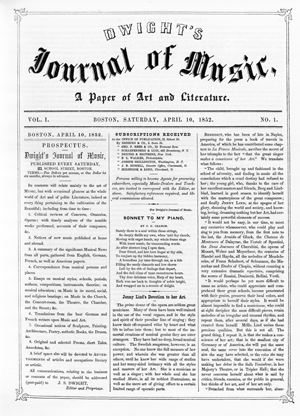Dwight’s Journal of Music

Published in Boston, John Sullivan Dwight’s journal appeared on a weekly basis until March 1863 and thereafter fortnightly until its demise. This chronicle of the development of music in the United States during the period immediately before and after the Civil War is a historical document of the utmost importance in American music history. Dwight, the journal’s sole editor, was a graduate of Harvard College and Harvard Divinity School, and from 1848 he pursued the career of a freelance writer on musical subjects. An idealist with a deep dedication to the finest aspects of European music making, Dwight sought to bring news of the European musical scene to American readers and to blend it with considerable coverage of the growing musical activities in the United States. The result was a full-fledged American music journal in the grand tradition of the finest French, British and German publications.
Reviews constitute an important part of the journal. These range from treatment of concerts and opera productions in Boston, New York, Philadelphia, Albany, Chicago, St. Louis, Baltimore, Washington, New Orleans and San Francisco, to performances given by touring operatic troupes and concert parties, directed by the impresarios Maurice Strakosch, Bernhard Ullman and Max Maretzek among others, and featuring famous European performers: singers Jenny Lind, Giulia Grisi, Mario, Thérèse Tietjens, Euphrosyne Parepa, Victor Maurel, Italo Campanini; violinists Ole Bull, Henri Vieuxtemps, Camilla Urso, Henri Wieniawski; and pianists Alfred Jaell, Arabella Goddard, Teresa Carreño, Hans von Bülow, Rafael Joseffy and Anton Rubinstein. The emergence of first-class American opera and concert singers is duly noted in reviews from home and abroad; among the performers are Adelaide Phillipps, Annie Louise Cary, Clara Louise Kellogg, Isabella Hinckley, Lilian Bailey, Charles Adams and Nordblom.
The development of performing organizations in the United States is richly documented by Dwight. The orchestra of the Germania Musical Society, the New York Philharmonic, Theodore Thomas’s orchestra, the Boston Symphony Orchestra and the Handel and Haydn Society are reviewed throughout the journal’s run. Concerts of chamber music, miscellaneous concerts with a variety of performers, and vocal concerts are prominently featured, and deal, in the main, with activities in Boston, New York and Philadelphia. In these reviews one encounters many European immigrants, some of whom continued their careers in the United States: pianists Richard Hoffmann, Otto Dresel and Carl Wolfsohn, soprano Erminia Rudersdorff, violinist and conductor Carl Rosa, violoncellists Wulf Fries and the Mollenhauer brothers.
A number of outstanding American writers are contributors to Dwight’s Journal of Music. Alexander Wheelock Thayer—the best-known nineteenth-century American music historian and the first reliable biographer of Beethoven—contributed weekly columns in series format discussing a wide variety of musical matters, and reviews of published books about music and concerts. Thayer’s own books on topics related to the Beethoven biography are also found in the journal. Other American writers include the composer and music theorist John Knowles Paine, the promising young critic William F. Apthorp, and critics W. S. B. Mathews and C. H. Brittan. Dwight arranged with the proprietors of Oliver Ditson & Co. to provide weekly four-page sheet music supplements.
This index was awarded the 1991 Vincent H. Duckles Award for best book-length bibliography or music reference work by the Music Library Association.
